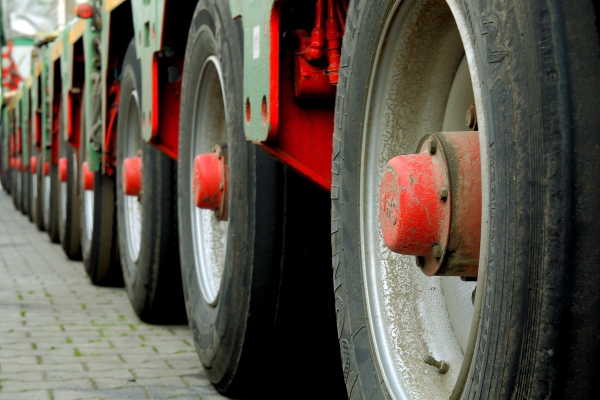
Disc brakes vs drum brakes – what is best?
31 Jan 2019
Category: OnRouteMag
From their introduction in heavy commercial vehicles in the 1980s, brake pads are nowadays commonly used in CVs as well as in most new semi-trailers and trailers across Europe. Brake friction supplier Lumag looks at the pros and cons of disc brakes and drum brakes.
Disc vs. Drum
Disc brakes can generate higher braking torque than drum brakes, but because braking torque remains more stable during long and repeated braking, this can lead to excessive brake disc heating. Drum brakes are less resilient in this respect, as they are susceptible to losing braking efficiency under high temperature and severe usage. On the other hand, drum brakes, owing to their compact structure and installation in an enclosed operating space, provide the advantage of limiting penetration of contaminants that usually lower the friction coefficient. Such a solution, however, hinders the dissipation of friction heat generated through braking.
The distinct advantage of drum brakes is their resilience to heavy-duty operation in off-road conditions. For this reason, they are often used in construction and agricultural machinery, and other vehicles operating on dusty dirt roads. Drum brakes are also installed in vehicles for less demanding, price-sensitive markets. Ever harder road conditions, growing vehicle mass and strict legal requirements pushed drum brakes to the limit of their capacity. Therefore today the majority of trucks and buses, as well as many trailers and semi-trailers, come equipped with disc brakes.
Advanced technology
In addition to high braking torque, advantages of disc brakes include their low mass, compact installation size and high resistance to fading. What is more, brake discs feature low hysteresis (delay between the input and output), are much more technologically advanced and effective than drum brakes, and shorten the stopping distance to boot. However, one must strictly follow maintenance instructions and inspection intervals in order to ensure full satisfaction of user requirements.
There are four major factors influencing the life of pads and discs in brake discs equipped with moving calipers: correct sliding of calipers in their guides, properly operating payload adjusting system, the condition of internal caliper components and adequate braking force distribution in tractor-trailer combinations. Brake discs are much more effective when the steering systems includes electronic adjustment systems. The full potential of an EBS system could not be utilised without its integration with brake discs. Moreover, the application of lighter brake discs reduces the unsprung weight of vehicles, significantly lessening wheel and steering system vibration.
Less cost, longer service life
A special advantage offered by drum brakes is their natural self-applying, or self-energising characteristic (during braking, the pressure of brake shoes exerted on the drum is heightened by the torque of the spinning wheel). This ensures high braking efficiency under low unit pressure, but at the same time hinders the operation of electronic braking systems. Also, drum brakes are cheaper to produce and boast longer service intervals.
When they are cold, braking efficiency of both brake types is comparable, but as the temperature rises, so does the superiority of disc brakes comes to the fore. This results from higher thermal stability of friction materials and a constant contact area between brake pads and the disc. In contrast, brake shoes deform when heated and the contact area between the friction material and the drum is reduced.
The UK market does seem quite unique vs the rest of Europe in terms of specifying drum brakes vs disc brakes, particularly when it comes to trailers and semi-trailers. UK operators have migrated back to drum brakes after an initial high take-up of disc brake actuation in the early years of the technology. This is largely due to the ratio of trailers to tractor units (almost three trailers to one tractor unit) and the potentially long-standing times between usages for trailers. Disc brakes can be more susceptible to seized components in the caliper than a drum brake unit (due to its constant exposure to the elements).
Find out more
For further details on Lumag’s ranges available to the aftermarket, please call + 44 (0) 121 520 1160 or email [email protected]. Alternatively, visit www.lumagltd.co.uk or http://lumagcatalog.mp-electronics.com.pl/ to find the latest products.
TruckTEC STEERING THE WAY IN CV AFTERMARKET COMPONENTS
Building on the success of TruckTEC V-Stay range we are taking steering to the next...
Read MoreR B Trucks named TOP TRUCK Workshop of the year 2019
Norfolk based TOP TRUCK workshop R B Trucks are leading the way with the latest...
Read MorePartic - CV Member of the year for the 3rd year running
East Midlands based Partic Motor Spares has celebrated 40 years in business this year as a...
Read More